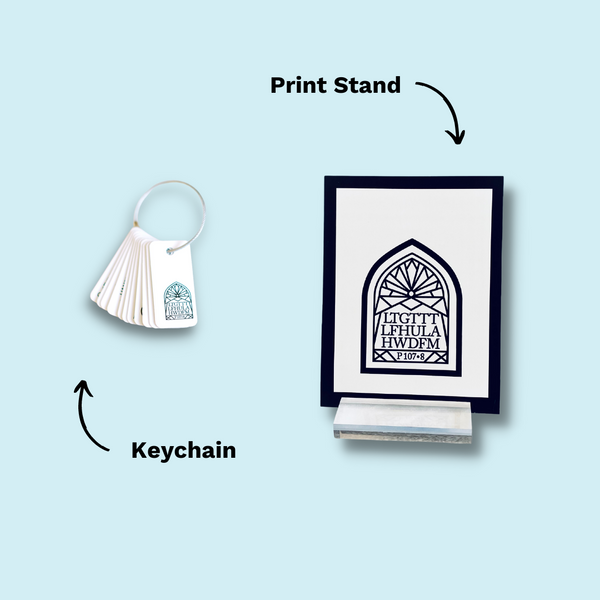“Religion that God our Father accepts as pure and faultless is this: to look after orphans and widows in their distress and to keep oneself from being polluted by the world.” — James 1:27
Do you ever wonder if you’re really a Christian? Do you ever question if you’re truly saved by Jesus? Even after decades of following Christ, I am sometimes paralyzed by this question. Sometimes doubt creeps in and I internally wrestle, Is my salvation real?
James, the brother of Jesus and a leader of the early church, offers us a sort of test for our salvation in our memory verse this month. He says, “Religion that God our Father accepts as pure and faultless is this: to look after orphans and widows in their distress and to keep oneself from being polluted by the world" (James 1:27). If our faith is real, James says, we will care for the vulnerable and we will keep ourselves from being influenced by the world.
Not the Way to Be Saved
Now these two practices are not the way to be saved. Rather these are two of many practices we will pursue if we are saved. To be clear, salvation is a free gift from God. It is “because of his great love for us, God, who is rich in mercy, made us alive with Christ even when we were dead in transgressions—it is by grace [we] have been saved…through faith—and this is not from [ourselves], it is the gift of God—not by works, so that no one can boast” (Ephesians 2:4–5, 8–9).
What James is getting at here is that if we are truly saved—if our religion is “pure and faultless”—then it will be evident in our actions. Genuine Christians are people who care for the vulnerable. And genuine Christians are people who are careful not to follow the world. In today’s devotional we’ll focus on the first of these two practices, and in next week’s devotional we’ll focus on the second.
Not the Sum Total of Our Faith
James’s test for our salvation is not exhaustive. John Calvin put it this way, “[James] does not define generally what religion is, but reminds us that religion without the things he mentions is nothing.” This verse doesn’t sum up true Christianity. True Christians will do more than what is mentioned here. But true Christians will not do less than what is mentioned here.
Later in his letter James says “faith without deeds is dead” (James 2:26). Our deeds display our faith. They do not save us, but they reveal what we really believe. When you and I wonder if we are truly saved, James asks us, Do you care for the vulnerable? If we look after widows and orphans, if we extend care to those who cannot care for themselves, then James says this is evidence of our real salvation.
God’s Constant Concern for Orphans and Widows
If we look only at our memory verse and not the entirety of James’s letter, or the entirety of Scripture, we may wonder why these two things, when there are so many other ways we could test our faith?
Care for orphans and widows is not James’s idea. It’s not even an idea that surfaced with the New Testament. God commands his people to care for orphans and widows throughout the entire Bible.
- When God gives the law to Moses for Israel he commands, “Do not take advantage of the widow or the fatherless. If you do and they cry out to me, I will certainly hear their cry” (Exodus 22:22–23).
- The prophets make clear God’s heart for orphans and widows. Isaiah says, “Learn to do right; seek justice. Defend the oppressed. Take up the cause of the fatherless; plead the case of the widow” (Isaiah 1:17). Zechariah says, “This is what the LORD Almighty said: ‘Administer true justice; show mercy and compassion to one another. Do not oppress the widow or the fatherless, the foreigner or the poor. Do not plot evil against each other’” (Zechariah 7:9-10).
- The psalmists express God’s heart for orphans and widows. “A father to the fatherless, a defender of widows, is God in his holy dwelling” (Psalm 68:5) and “The LORD watches over the foreigner and sustains the fatherless and the widow, but he frustrates the ways of the wicked” (Psalm 146:9).
- In the Gospel of John Jesus says, “I will not leave you as orphans; I will come to you” (John 14:18) and the apostles are sure to provide care for widows in Acts 6:1-4 and 1 Timothy 5:3.
James’s test for true Christianity is not random. It is rooted in God’s heart, which is on display from the beginning pages of Scripture to the end.
Are You Looking After Orphans and Widows?
Christian friend, are you doing this? When you look at your calendar, your budget, and your life, do you see evidence of your pure and faultless religion by the way you care for the vulnerable? James doesn’t mince words here. The expectation is clear: all true followers of Jesus will exhibit sacrificial care for those who are marginalized.
This doesn’t mean every Christian is called to adoption or foster care, or that we are all called to spend our days in nursing homes. But we are called to something. It can be easy in our fast-paced and full lives to neglect this command. It can be easy to think this command is for other Christians. But this command is for all who claim Christ. May we not neglect it.
Our kind, merciful, and intentional God did not leave us as orphans. He came to us. Our God is a go-er, a rescuer, a redeemer of those who are without hope. As he looks after you and me, he asks us to look after those who cannot look after themselves. Brothers and sisters, this matters deeply to our Father in heaven. May it matter deeply to us as well. May our pure and faultless religion be seen in our real and tangible care for orphans and widows.




